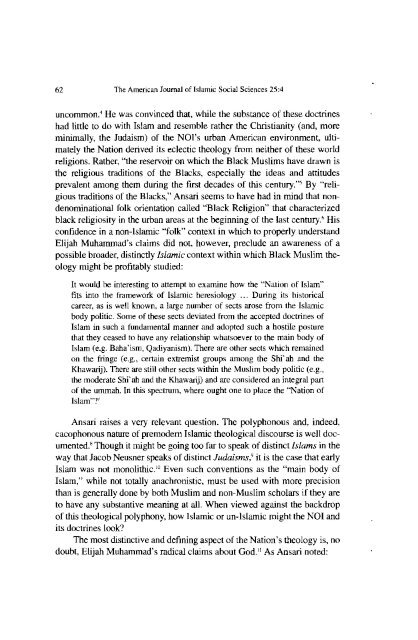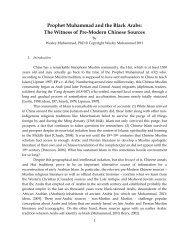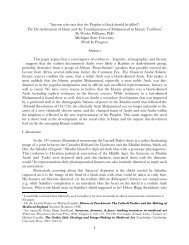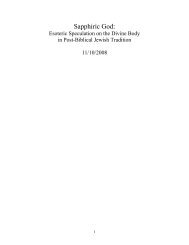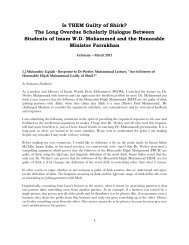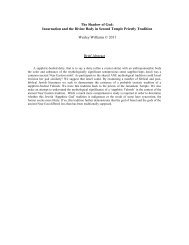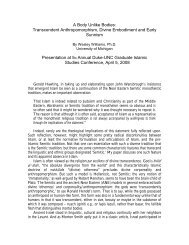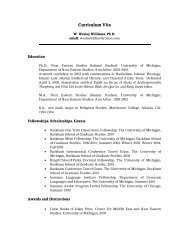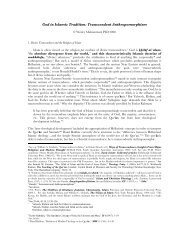Black Muslim Theology and the Classical Islamic Tradition ...
Black Muslim Theology and the Classical Islamic Tradition ...
Black Muslim Theology and the Classical Islamic Tradition ...
Create successful ePaper yourself
Turn your PDF publications into a flip-book with our unique Google optimized e-Paper software.
62 The American Journal of <strong>Islamic</strong> Social Sciences 25:4<br />
uncommon.' He was convinced that, while <strong>the</strong> substance of <strong>the</strong>se doctrines<br />
had little to do with Islam <strong>and</strong> resemble ra<strong>the</strong>r <strong>the</strong> Christianity (<strong>and</strong>, more<br />
minimally, <strong>the</strong> Judaism) of <strong>the</strong> NO!'s urban American environment, ultimately<br />
<strong>the</strong> Nation derived its eclectic <strong>the</strong>ology from nei<strong>the</strong>r of <strong>the</strong>se world<br />
religions. Ra<strong>the</strong>r, "<strong>the</strong> reservoir on which <strong>the</strong> <strong>Black</strong> <strong>Muslim</strong>s have drawn is<br />
<strong>the</strong> religious traditions of <strong>the</strong> <strong>Black</strong>s, especially <strong>the</strong> ideas <strong>and</strong> attitudes<br />
prevalent among <strong>the</strong>m during <strong>the</strong> first decades of this century.'" By "religious<br />
traditions of <strong>the</strong> <strong>Black</strong>s," Ansari seems to have had in mind that nondenominational<br />
folk orientation called "<strong>Black</strong> Religion" that characterized<br />
black religiosity in <strong>the</strong> urban areas at <strong>the</strong> beginning of <strong>the</strong> last century.' His<br />
confidence in a non-<strong>Islamic</strong> "folk" context in which to properly underst<strong>and</strong><br />
Elijah Muhammad's claims did not, however, preclude an awareness of a<br />
pussible broader, distinctly <strong>Islamic</strong> context within which <strong>Black</strong> <strong>Muslim</strong> <strong>the</strong>ology<br />
might be profItably studied:<br />
It would he interesting to attempt to examine how <strong>the</strong> "Nation of Islam"<br />
fits into <strong>the</strong> framework of <strong>Islamic</strong> heresiology ... During its historical<br />
career, as is weB known, a large number of sects arose from <strong>the</strong> <strong>Islamic</strong><br />
body politic. Some of <strong>the</strong>se sects deviated from <strong>the</strong> accepted doctrines of<br />
Islam in such a fundamental manner <strong>and</strong> adopted such a hostile posture<br />
that <strong>the</strong>y ceased to have any relationship whatsoever to <strong>the</strong> main body of<br />
Islam (e.g. Baha'ism, Qadiyanism). There are o<strong>the</strong>r sects which remained<br />
on <strong>the</strong> fringe (e.g., certain extremist groups among <strong>the</strong> Shrah <strong>and</strong> <strong>the</strong><br />
Khawarij). There are still o<strong>the</strong>r sects within <strong>the</strong> <strong>Muslim</strong> body politic (e.g.,<br />
<strong>the</strong> moderate Shi'ah <strong>and</strong> <strong>the</strong> Khawarij) <strong>and</strong> are considered an integral palt<br />
of <strong>the</strong> ummah. In this spectrum, where ought one to place <strong>the</strong> "Nation of<br />
Islam"??<br />
Ansari raises a very relevant question. The pulyphonous <strong>and</strong>, indeed,<br />
cacophonous nawre of premodern <strong>Islamic</strong> <strong>the</strong>ological discourse is well documented"<br />
Though it might be going too far to speak of distinct Islams in <strong>the</strong><br />
way that Jacob Neusner speaks of distinct Judaisms,' it is <strong>the</strong> case that early<br />
Islam was not monolithic.'" Even such conventions as <strong>the</strong> "main body of<br />
Islam," while not totally anachronistic, must be used with more precision<br />
than is generally done by both <strong>Muslim</strong> <strong>and</strong> non-<strong>Muslim</strong> scholars if <strong>the</strong>y are<br />
to have any substantive meaning at all. When viewed against <strong>the</strong> backdrop<br />
of this <strong>the</strong>ological polyphony, how <strong>Islamic</strong> or un-<strong>Islamic</strong> might <strong>the</strong> Nor <strong>and</strong><br />
its doctrines look?<br />
The most distinctive <strong>and</strong> defining aspect of <strong>the</strong> Nation's <strong>the</strong>ology is, no<br />
dotibt, Elijah Muhammad's rddical claims about God." As Ansari noted:


